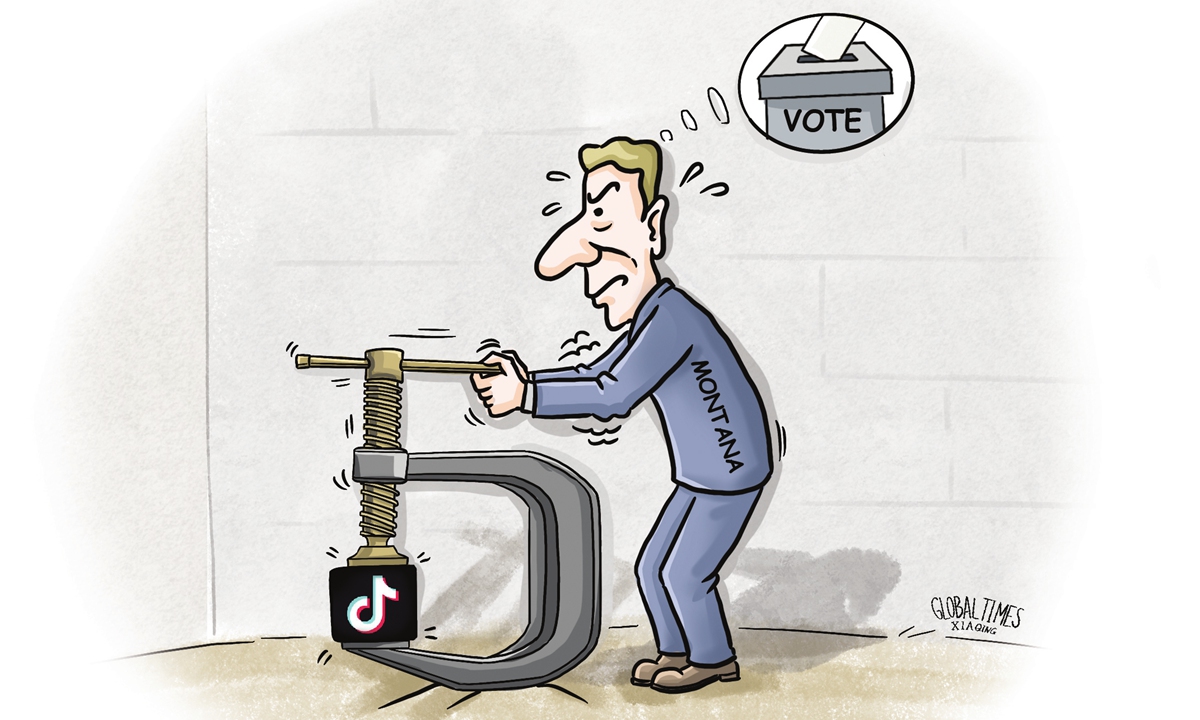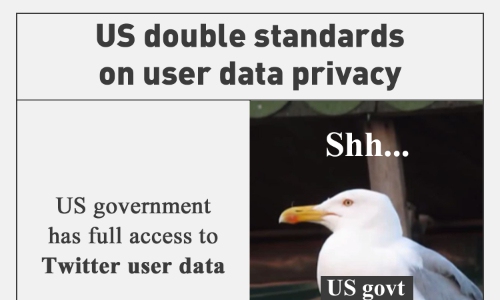Opportunism of TikTok ban in Montana borne out of deceptive ‘China threat’ narrative

Illustration: Xia Qing/GT
The US state of Montana has taken the drastic step of banning the popular social media app TikTok within its borders. Enforcement will begin January 1, 2024, presuming the law is valid. And there are legitimate questions about that.
Let us not mince words here. The new law is the latest of many irrational decisions relating to China emanating from the United States, a country gripped by an illogical fear that China is determined to destroy the US and its democratic allies. And what is at the root of that fear? Simple, really: China refuses to kowtow to the West and accept its vision of how the world should operate.
Think about this for just a minute: Political figures throughout Washington and across the 50 states are afraid of a social media app because, they claim, the Chinese government can swoop in at any minute and demand TikTok's owners' hand over the data it has about its US users. Keep in mind, there is zero evidence that the Chinese government has ever made such a demand in the past, or that it intends to in the future.
The political class will also say that once the government has access to that data, the individual user could be susceptible to either pro-China or anti-West propaganda created by the government. Here again, there is zero evidence that the Chinese government has done this in the past, or that it intends to in the future.
TikTok's CEO testified before Congress about two months ago, when he told lawmakers TikTok is committed to "American data [being] stored on American soil, by an American company, overseen by American personnel." No politician appeared to believe him.
Of course, do not ask those same politicians if they said anything overly critical about that authorization George W. Bush made when he was president allowing the National Security Agency to wiretap the phones of Americans without first getting court approval to do so. That ill-conceived idea made when the fear of Muslims and terrorism was at its peak blew up in the president's face once US media began reporting what was taking place. And, yet, Bush administration officials defended the president's choice despite knowing it ran counter to the country's fundamental beliefs about the rule of law.
When Montana's governor signed the TikTok ban into law on May 17, he announced it would"protect Montanans' private data and sensitive personal information from being harvested by the Chinese Communist Party." Those two words - "Communist Party" - are used whenever any political figure in the United States seeks to score political points with American citizens. Perhaps those politicians think that rational adults will hear the words "Communist Party" and soon act like irrational children who wake up in the middle of the night afraid that there is a monster under the bed. A quick look by parents and a reassuring hug and kiss reminds the child that there are no monsters, and that going back to sleep is perfectly safe.
Are we really reaching the stage of US-Chinese relations that American adults need to be told that China is not some monster under the bed? Then again, perhaps we are already there. Sadly, it is the Asian-American community that should be most worried about the paranoia about China in the United States. The growing hostility toward Asians, no matter from which country they trace their roots, is a byproduct of that constant news suggesting that they represent a threat to America.
There is one element to the Montana law that defies common sense. If the goal is truly to prevent "Montanans' private data" from the "Chinese Communist Party," then explain why the law does not penalize anyone in the state who uses TikTok. Rather, companies, such as Google or Apple, that make the app available for download could face penalties of up to $10,000 per day.
Justifiably, ByteDance, the Chinese company that owns TikTok, has made clear it will fight the law, noting correctly that it "infringes on the First Amendment rights of the people of Montana."
We should not forget that it was only six years ago when Montana officials were celebrating Chinese businesses. In 2017, JD.com, the giant Chinese retailer, agreed to buy $200 million worth of cattle in Montana and invest another $100 million in a new packing plant in the state. Republican senator Steve Daines was in a celebratory mood back then, saying, "Clean air, pristine waters, the high-quality beef that Montana produces, it's a great brand that we can actually sell in China and this will be very good for Montana cattle producers. And the Montana Standard newspaper also applauded the deal, noting the Montana senator"engaged in effective one-on-one diplomacy, reflecting his pre-political experience opening foreign markets to US goods."
Unfortunately, the deal fell apart because of the ridiculous trade war the Trump administration announced a few months later.
Much has changed since then.
TikTok estimates it has 150 million users in the US, which means that roughly 45 percent of all Americans engage with the app. It is not silly to suggest if the law is found to be unconstitutional that politicians will resort to urging Americans to do the "right" thing and remove TikTok from their phones.
No, the "right" thing to do is to change the narrative about China and begin working alongside that country's political, economic, civil society, educational and other leaders to address many of the globe's most complex problems.
The author is an associate professor at the Department of Communication and Organizational Leadership at Robert Morris University. opinion@globaltimes.com.cn

